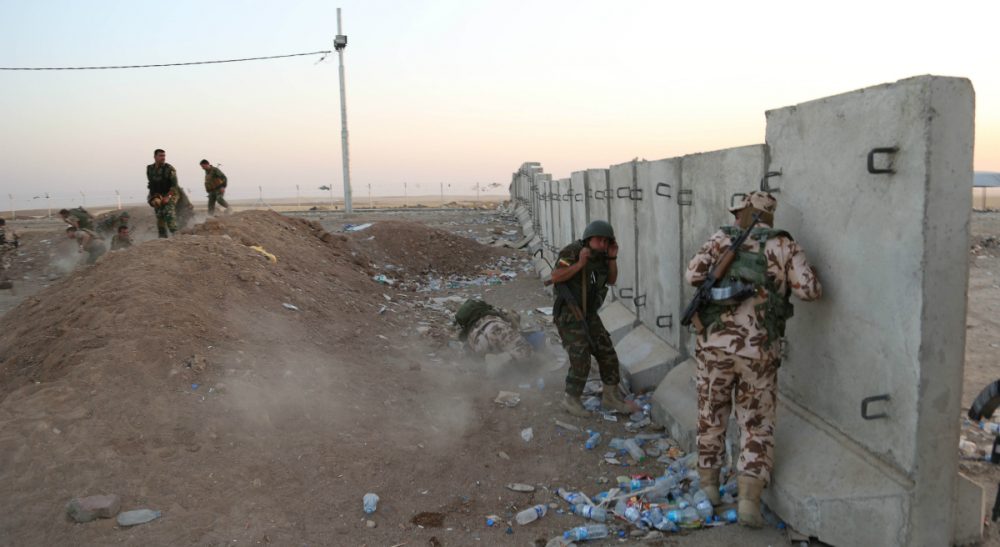Advertisement
Past Lessons, Current Threats: Assessing Obama’s Case For War Against ISIS

If you’re of two minds about the new war against ISIS, you’re not alone. Rarely has a major military initiative by a president been greeted with such ambivalence. It’s not hard to understand why.
President Obama’s speech Wednesday night outlining a strategy to degrade and destroy the Islamic State of Iraq and Syria was a call to arms. ISIS does appear to be particularly brutal and expansionist. Its beheading of two American journalists is the proximate cause of a spike in public support for intervention, but ISIS’s treatment of minorities, women and anyone not aligned with its septic brand of Salafism is even more repulsive.
...two very challenging questions surround Obama’s strategy. The first is whether ISIS really warrants this attention – essentially, a declaration of war from the United States. The second is whether the strategy will yield the intended results.
But two very challenging questions surround Obama’s strategy. The first is whether ISIS really warrants this attention – essentially, a declaration of war from the United States. The second is whether the strategy will yield the intended results.
Of the first question, the answer depends on whether one is concerned only about U.S. security, in which case the answer is “no.” If one’s concerns extend more broadly to stability in the region and the impulse to save strangers’ lives, the answer could be “yes.” The best case for destroying ISIS draws on the latter sentiment. But there’s also a plausible argument that denying a violent group like that its own territory — think Taliban in Afghanistan and the 9/11 attacks — could be a national security priority, not just a gesture of caring for the Muslims, Yazidis and Christians of the beleaguered region.
Just how the U. S. would eradicate ISIS is where things get murky. Obama articulated a two-pronged strategy. First is the air war, with the U. S. bombing ISIS targets and offering air support to Iraqi army and Kurdish peshmerga operations. Second is training and supporting the Iraqi and Kurdish forces and “moderate” Syrian rebel forces that will fight ISIS and, given the broader scenario, the Assad government as well.
So far, bombing and air support have worked reasonably well, according to most accounts, in driving ISIS away from some cities and towns in Iraq; in liberating Yazidis; and in protecting assets like dams on the Euphrates. If U. S. actions continue at this level, then the intervention may be successful. It requires the Iraqi military and Kurdish fighters to engage vigorously on the ground. It also diminishes the U. S. “footprint,” not least in causing civilian casualties, which invariably pumps up anti-Americanism in the local population.
The last point is crucial, because it is the bête noire of U. S. interventions in the region. American politicians and news media have not fully appreciated this. Afghan President Karzai’s constant complaints about such “collateral damage” are often treated derisively, for example, and the mortality from the Iraq war is routinely discounted by a factor of four or five. Yet it is precisely because of such human costs that Middle Eastern political leaders are so chary of U. S. intentions.
That is vividly illustrated by what’s happening in Yemen, which was mentioned by the president in his speech this week as an example of how we will conduct war against ISIS. A Washington Post reporter in Sanaa relays the dispiriting fact that U. S. drone strikes there are alienating much of the population. “These attacks are making people say, ‘We believe now that al-Qaeda is on the right side,’ ” a Yemeni businessman said. Even this very light-handed operation is barely working to keep al-Qaeda from taking control of several provinces in Yemen. As a number of analysts have pointed out, the anti-ISIS campaign has to do more – namely, take territory back, which is a much harder task.
The other aspects of the strategy are equally fraught. Getting the Iraqis to stand up to ISIS is the most likely frustration. But at least dealing with a legitimate state holds some promise of success, no matter how limited. Some accountability and transparency exist. Backing rebels has a much more dodgy history, and the case of the Syrian rebels could not be less promising. We have been down this road often, with tragic results. The so-called Reagan Doctrine is Exhibit A. President Reagan backed “rebels” (or mercenaries) in Nicaragua, Angola, Afghanistan and Cambodia, all with catastrophic results. Indeed, one can draw a line of causation from supporting the Afghan mujaheddin to many of the jihadist conflicts in the Middle East today.
That Obama did not mention 'diplomacy' in his speech is telling, because a strategy without it is hollow.
But supporting violent, non-state actors has an even more recent and equally unsavory pedigree. Libya is one particularly sad example, a country now in chaos after Obama and others supported an armed rebellion against strongman Muammar Gaddafi. In Syria, the “moderate” rebels have reportedly sold U.S. weapons to ISIS and are guilty of grotesque human-rights violations. More important, the line separating jihadists and moderates is a blurry one at best. We simply can’t guarantee that support for any rebel groups will produce the intended results.
Diplomacy to resolve the Syrian civil war has fallen flat time and again, as have attempts to press an inclusive government on the Shia power brokers in Baghdad. That Obama did not mention “diplomacy” in his speech is telling, because a strategy without it is hollow. (He also didn’t mention Iran, the most capable ally against ISIS in the region.) The military options are many and always seductive for a commander-in-chief. But these kinds of options have not brought success to U.S. presidents past and present. They are unlikely to do so now.
Related:
